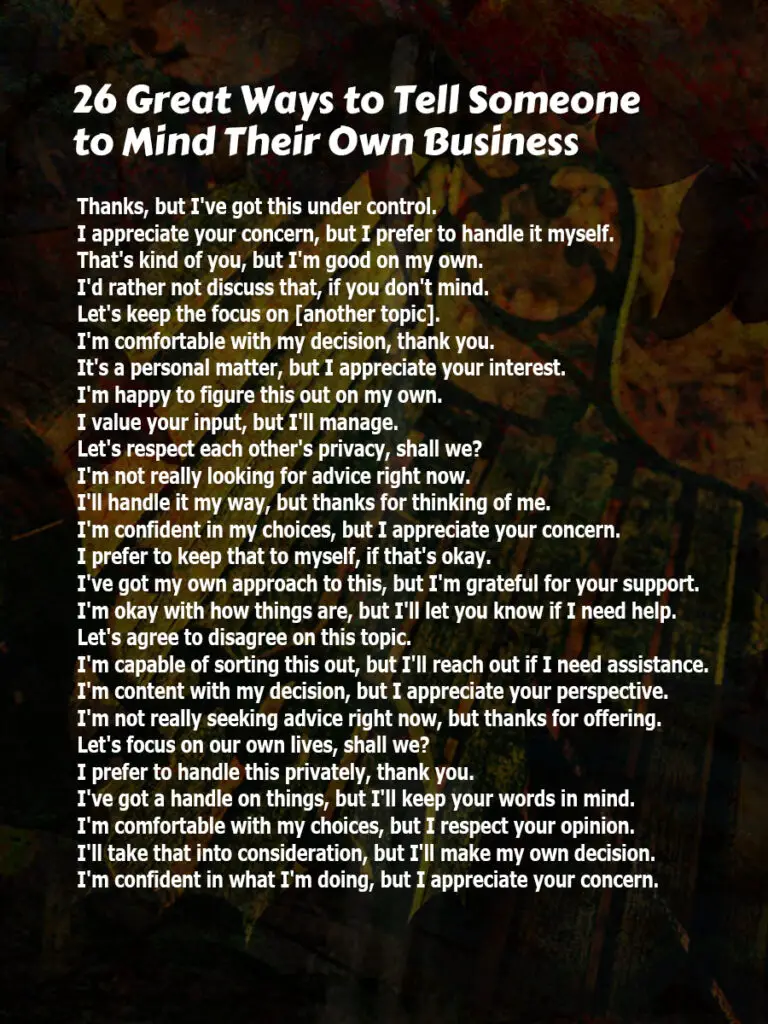Have you ever felt like someone was too nosy? Like they’re always poking their nose where it doesn’t belong? Well, you’re not alone! Sometimes, people need a gentle reminder to mind their own business. But how do you say it without being rude?
Don’t worry, we’ve got you covered! In this article, we’ll explore 26 great ways to tell someone to mind their own business. From polite phrases to clever comebacks, you’ll learn how to set boundaries and keep your personal space safe.

Here are 26 Great Ways to Tell Someone to Mind Their Own Business:
- Thanks, but I’ve got this under control.
- I appreciate your concern, but I prefer to handle it myself.
- That’s kind of you, but I’m good on my own.
- I’d rather not discuss that, if you don’t mind.
- Let’s keep the focus on [another topic].
- I’m comfortable with my decision, thank you.
- It’s a personal matter, but I appreciate your interest.
- I’m happy to figure this out on my own.
- I value your input, but I’ll manage.
- Let’s respect each other’s privacy, shall we?
- I’m not really looking for advice right now.
- I’ll handle it my way, but thanks for thinking of me.
- I’m confident in my choices, but I appreciate your concern.
- I prefer to keep that to myself, if that’s okay.
- I’ve got my own approach to this, but I’m grateful for your support.
- I’m okay with how things are, but I’ll let you know if I need help.
- Let’s agree to disagree on this topic.
- I’m capable of sorting this out, but I’ll reach out if I need assistance.
- I’m content with my decision, but I appreciate your perspective.
- I’m not really seeking advice right now, but thanks for offering.
- Let’s focus on our own lives, shall we?
- I prefer to handle this privately, thank you.
- I’ve got a handle on things, but I’ll keep your words in mind.
- I’m comfortable with my choices, but I respect your opinion.
- I’ll take that into consideration, but I’ll make my own decision.
- I’m confident in what I’m doing, but I appreciate your concern.
See Also: 30 Best Ways to Respond to “Just Got Out of the Shower”
Setting Boundaries
Setting Boundaries: Encouraging someone to mind their own business can be a delicate task, but setting boundaries is crucial.
Being Assertive In Communication
- You can assert yourself by using “I feel” statements to express your boundaries clearly.
- Empower yourself and practice assertive body language for confident communication.
- Be firm yet respectful in your demeanor to establish your boundaries effectively.
Clearly Stating Personal Limits
- Communicate openly about your personal boundaries without hesitation.
- Use clear and direct language to avoid misunderstandings about your limits.
- Reinforce your boundaries by standing firm and not wavering in your stance.
Redirecting Conversations
Redirecting conversations is a subtle yet effective way to encourage someone to mind their own business, without causing conflict. Here are some strategies to help you tactfully change the subject when faced with nosy inquiries.
Steering Discussions Away From Personal Matters
When someone begins probing into your personal life, it’s essential to tactfully guide the conversation away from sensitive topics. Instead of providing detailed responses, try steering the discussion toward neutral or light-hearted subjects that are far removed from your private affairs.
This approach can help shift the focus away from intrusive inquiries and onto more general topics that are less likely to invite further prying. By effectively steering the conversation away from personal matters, you can subtly communicate your boundaries and redirect the interaction onto safer ground.
Changing The Topic Tactfully
In situations where someone continues to pry despite your efforts to redirect the conversation, it may be necessary to change the topic directly but tactfully. Introduce a new, engaging topic that captures the attention of both parties, effectively shifting the focus away from the intrusive line of questioning.
By skillfully transitioning to a different subject, you can redirect the dialogue without causing tension or discomfort. Choosing a topic that is unrelated to personal matters allows you to gracefully guide the conversation in a new direction while maintaining a positive and harmonious interaction.
Modeling Behavior
Supportive modeling behavior can positively influence others to prioritize their own concerns and focus on personal growth and development. Setting clear boundaries, demonstrating assertiveness, and practicing self-care can encourage individuals to respect personal space and autonomy.
Leading By Example In Respecting Privacy
Respecting privacy is essential in fostering a culture of minding one’s own business. By showing others that you value and uphold their privacy, you set the stage for them to do the same. Make it a point to keep confidential information to yourself, refraining from prying into others’ personal matters, or spreading gossip.
Ensure your online presence reflects this as well — avoid snooping on social media or engaging in online drama. When others witness your commitment to respecting privacy, they will be more likely to follow suit.
Showing How To Focus On One’s Own Affairs
Redirecting attention to one’s own affairs is an effective way to encourage individuals to mind their own business. Demonstrate a sense of self-awareness and prioritize your own goals and responsibilities, showing that you are focused on bettering yourself rather than getting involved in others’ affairs.
Avoid being nosy or asking intrusive questions, instead, cultivate conversations that revolve around shared interests and experiences. By modeling this behavior, you remind others of the importance of staying focused on their own journey rather than meddling in the lives of others.
Privacy Protection Strategies
Learn effective privacy protection strategies by encouraging individuals to prioritize their personal boundaries and respect others’ privacy, fostering a culture of mutual understanding and discretion. Establishing open communication and setting clear expectations can help reinforce the importance of minding one’s own business while maintaining healthy relationships.
Securing Personal Information
One of the most crucial aspects of protecting your privacy is to secure your personal information. By following a few simple steps, you can greatly reduce the risk of your sensitive data falling into the wrong hands:
- Create strong passwords: Choose passwords that are unique and contain a combination of letters, numbers, and special characters. Avoid using easily guessable information such as your birth date or pet’s name.
- Enable two-factor authentication: Many online platforms offer this additional layer of security. By enabling two-factor authentication, you ensure that even if someone guesses your password, they still need a second verification method to access your account.
- Update your software regularly: Keep your computer and other devices updated with the latest security patches and software versions. These updates often include important fixes for vulnerabilities that could be exploited by hackers.
- Be cautious with public Wi-Fi: Public Wi-Fi networks can be easily compromised, giving hackers access to your data. Avoid logging into sensitive accounts or accessing private information when connected to public Wi-Fi.
Limiting Social Media Exposure
Social media platforms play a significant role in our lives, but they can also be a goldmine of personal information for potential intruders. Implement the following strategies to limit your social media exposure:
- Review privacy settings: Take a few minutes to familiarize yourself with the privacy settings of your social media accounts. Adjust them to ensure that only trusted individuals can view your personal information and posts.
- Be mindful of the information you share: Think twice before posting personal details such as your address, phone number, or upcoming vacation plans. Sharing such information publicly can leave you vulnerable to identity theft or physical harm.
- Audit your friend list: Regularly review your connections on social media and remove individuals who you no longer trust or recognize. Keeping your friend list limited to those you genuinely know can help protect your privacy.
- Avoid oversharing: While it may be tempting to share every aspect of your life online, consider the potential risks. Think carefully about the long-term consequences of revealing too much personal information.

More Additional Response
- I’ve got this covered, but I’ll reach out if I need assistance.
- Thanks for your input, but I’m handling it my way.
- I appreciate your concern, but I prefer to deal with it independently.
- Let’s keep this between us for now, okay?
- I’ll manage on my own, but I’m grateful for your thoughts.
- I’m comfortable with my decision, but I understand your perspective.
- I’m taking care of it, but I’ll keep you updated if necessary.
- I value your opinion, but I’ve already made up my mind.
- I’m capable of resolving this myself, but I appreciate your offer to help.
- Let’s agree to respect each other’s boundaries.
- I’m handling it internally, but thanks for your concern.
- I’m confident in my approach, but I’ll consider your advice.
- I’ve got a plan in place, but I’ll keep you in the loop if anything changes.
- I’m managing fine, but I’ll let you know if I need assistance.
- I prefer to handle this privately, but I appreciate your support.
- I’m comfortable with my decision-making process, but thank you for your input.
- I’m content with my choices, but I’ll take your perspective into account.
- I’m capable of handling this situation, but I’ll reach out if necessary.
- I’ve already thought it through, but I’ll keep your advice in mind.
- I’ve got everything under control, but I appreciate your concern.
I hope these polite ways to set boundaries were helpful! Remember, it’s okay to assert your privacy kindly. Using these phrases can keep conversations respectful. Thanks for reading about handling nosy situations!









